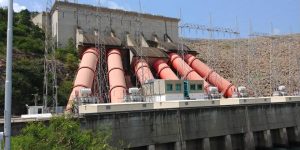The Minister of Environment, Science, Technology and Innovation, (MESTI), Dr. Kwaku Afriyie, has hinted government is considering a plastic waste management policy that will impose certain levies on consumers who use plastic products.
The policy, which is at a consideration stage, according to him will capture the inputs of all stakeholders involved in the manufacturing, management and recycling of plastic products.
“We have had several meetings. I do not want to give timelines. Ghanaians will soon see concrete action. We have to bring in an incentive mechanism and invite the private sector. We have to put some levies on certain items that the consumer will have to pay,” Dr. Afriyie assured in reaction to questions after Ghana signed a grant agreement with Switzerland.
Describing plastic waste management in Ghana as a complex field, the minister explained that there are areas that will require incentives to discourage the use of plastic, while some parts will require that the consumer pays more for using plastics.
He stated, for example, that the approach to be used for taking care of sachet-water bags will be different from the approach to black polyethene bags. “The end product should be that we can properly recycle this plastic,” he reiterated, adding that there must be a comprehensive process to get all plastic recycled.
Committees working on the policy
Dr. Afriyie disclosed that various engagements have gone on with the Ministry of Water and Sanitation to make the policy a holistic document.
He stated that committees have been formed to engage all players in the waste management sector. “We have several committees working on this. We want to get it right. It is a complex issue; it is not a simple act. Suffice it to say, we appreciate the nuisances. In a couple of months Ghanaians will see boots on the ground collecting these plastics,” he said.
Involving the private sector
Even though some amount of recycling plastic waste occurs in Ghana, Dr. Afriyie stated that it however does not involve much of the black polythene bags which create such great environmental pollution.
To solve this, he stated, government must create incentives for private recycling companies to go into the management of black polythene bags. “The private sector is very important to this sector. You can see that even though a lot of recycling is going on, the main eyesores are pure-water bags and black polyethene bags.”
Projections by government
According to MESTI, a vibrant recycling industry in Ghana could recover nearly one million tonnes of plastic waste from the environment and landfills annually – to be recycled into basic-need products valued at GH¢2billion per year, thus creating 5 million jobs across the economy.
The Strategic Actions mandated in government’s Waste Management Policy will create the strategic support necessary for both industry and government agencies in Ghana to plan for large-scale recycling of plastic that is market-driven.







